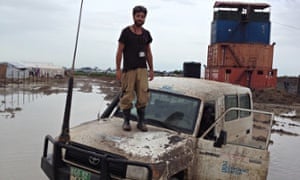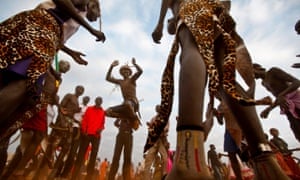An aid worker recounts his experiences working for NGOs while under fire in newly independent South Sudan
Date: Tue, 19 May 2015 12:58:02 +0200
Three days after I arrived in Tambura, the people of the small village celebrated South Sudan’s first birthday. It was July 2012, and I was there as a volunteer for International Medical Corps. It was a joy to watch the celebrations in this place 460km from the capital, Juba. Hundreds of people were parading, dancing, and singing, reflecting the relief and hope that had come after four decades of war.
I can’t complain about my life in Juba – you would not have variety, but you would find a little of everything. The restaurants were few, but they served global cuisines, and there were good bars that were usually filled with expats for after-office hangouts – they could be confused for being any European pub. After all, alcohol is the party anthem regardless of a nation’s instability. For fitness enthusiasts there were sports grounds. The roads were mostly potholes but at least they connected major areas of the city. Importantly, the team that I worked with was amazing – strangers quickly turned into friends in those resource-constrained settings.
My life in South Sudan was quite normal until war broke out on the night of 15 December 2013. By then, I worked in operations for the Danish Refugee Council and I went to the field to set up logistics, healthcare, water and sanitation programmes. My heart would skip a beat with every gunshot I heard, and that continued for two to three days. Organisations who could afford to charter planes started to pull out their staff, initially from the capital and then later from the field offices. The airport was full of queues of people rushing to leave the country. Within a week, only about 20% of staff remained, including my colleagues Gaurav and Julian and me.

The remaining expats started to gather at the compound for the United Nations Missions in Sudan (UNMis). The place was dirty and crowded. People would think of their family, their children back home, but no one was able to speak of their fear with each other. Gaurav was my superviser and hangout buddy, but we were unable to talk to each other. The emotions were so intense they were difficult to put into words.
When we would return to our residence in the evening, we would talk about digging an escape hole in our compound, just in case. I often looked around the room to spot a place to hide in case the gunfire started again. The news of an attack on a humanitarian base, lootings and killings had become normal. Only after a week did awestruck people start communicating with each other, building mutual confidence to survive, and discussing response strategies.
By January, more humanitarian staff started arriving because organisations had started receiving emergency funds. I was deployed to Bentiu, a field site that had seen an attack only a week before. The situation was no better, corpses were lying on the road and the living conditions were harsh.
Slowly, things got better. More tents were added and more people arrived, but still the canteen in the UNMis compound was only able to cook rice and beans for several days, as they were running out of supplies and cargo could not arrive due to security concerns. The day the cargo finally arrived, the joy of the workers knew no bounds, they would now get a proper meal to replenish their energy after working in the hot and humid weather.
After four months of improvements, war broke out again in mid-April. From the early morning, armoured vehicles hovered around the UNMis base and fired bullets. We had to run towards the bunkers with all the energy and passion to survive. Sanjeev (another of my colleagues) dodged a bullet by a few centimetres. When we entered the bunker, we all were shivering.
One evening, the humanitarian team brought in more than 100 wounded civilians from the town. Without any clinic being set up, people were running here and there providing water and primary treatment to the wounded people lying all over the ground.
On 19 April 2014 at around 3pm, I was standing outside one of my friends’ room (he had proper room unlike my tent), when I heard a strange sound and a huge blast. I ran inside, grabbed a helmet and a bullet-proof jacket and ran towards the bunker. Within the two minutes it took me to reach the bunker there had been another three blasts. That was the moment I earnestly begged God to save my life. Later we found out that it had been a BM 21 rocket launcher and had made a large hole where it landed.
By that time, my contract was coming to an end so I left Bentiu the next day. The moment our flight took off, I said to my colleague next to me: “Now that I think I am safe, I can tell my mom what I have been through.” Until then, I had not told my family anything.
The hope I had seen among the people when I first arrived in 2013 was no longer alive when I left in April 2014. I hope the situation is better now, and though I know a political consensus has not been reached yet, I hope their lives have become normal – by their own standards. Nothing makes you value life more than when you see death from so near.
